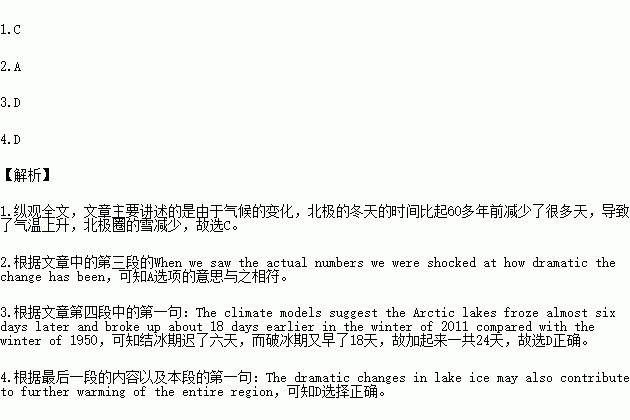题目内容
Alaska’s Arctic lakes now freeze later and melt earlier in the year than in 1950,leaving them easy to suffer water loss from evaporation(蒸发)and possibly adding to local warming,a new study finds.The winter ice season near Barrow,Alaska,is shorter than in 1950,researchers reported Jan.30 in the journal The Cryosphere.
Lake ice is also thinner each winter.The scientists surveyed 402 lakes on the North Slope,where permafrost (permanently frozen ground)and shallow lakes dominate the areA. In 2011,the lake ice was 38 percent thinner than in 1950,and 22 percent fewer lakes froze through to their bottoms.
“When we saw the actual numbers we were shocked at how dramatic the change has been,”lead study author Cristina Surdu,of the University of Waterloo in Canada,said in a statement.Surdu and her co-authors analyzed the changes in lake—ice thickness and ice cover with satellite images and climate model simulations(satellite images are only available from 1991).
The climate models suggest the Arctic lakes froze almost six days later and broke up about 18 days earlier in the winter of 2011 compared with the winter of 1950.“The changes in ice and the shortened winter affect Northern communities that depend on ice roads to transport goods,”Surdu saiD. For example,every winter,oil companies build roads over frozen lakes to carry supplies to Prudhoe Bay.
“The dramatic changes in lake ice may also contribute to further warming of the entire region,because open water on lakes contributes to warmer air temperatures,”Surdu saiD. The Arctic is warming twice as fast as the rest of the planet,for reasons that may include its layered atmosphere,which traps heat,and the loss of sea ice and snow cover,which help reflect the sun’s energy when present.
1.What does the text mainly tell us?
A. Arctic 1akes now freeze earlier and melt 1ater.
B. Alaska’s local warming is decreasing sharply.
C. Arctic lakes are losing ice.
D. Arctic lakes hold more flesh water than before.
2.According to the text,the great changes of Alaska’s Arctic lakes ________.
A. are totally beyond Surdu’s expectations
B. are completely within Surdu’s expectations
C. come as no surprise to Surdu and her co-authors
D. come as a great excitement to Surdu
3.How many days was the winter ice season of Arctic 1akes in 2011 shorter than that in 1950?
A. 6 days.
B. 12 days.
C. 18 days.
D. 24 days.
4.What is the last paragraph mainly about according to Surdu?
A. What reflects the sun’s energy.
B. How its layered atmosphere traps heat.
C. Why our planet is warming.
D. Why the Arctic region is becoming warmer.
 名校课堂系列答案
名校课堂系列答案

 .consequently B. occasionally C. always D. rarely
.consequently B. occasionally C. always D. rarely